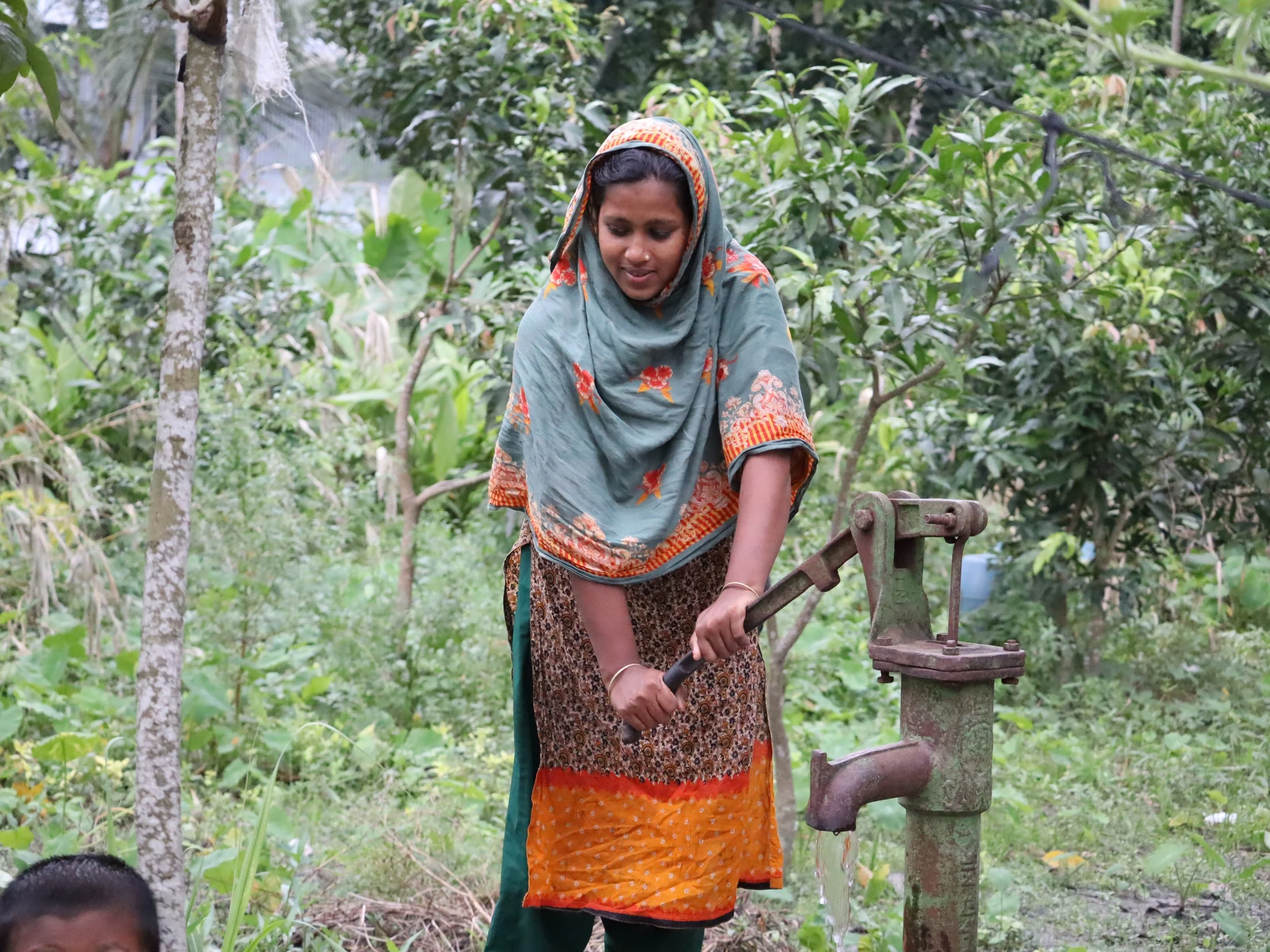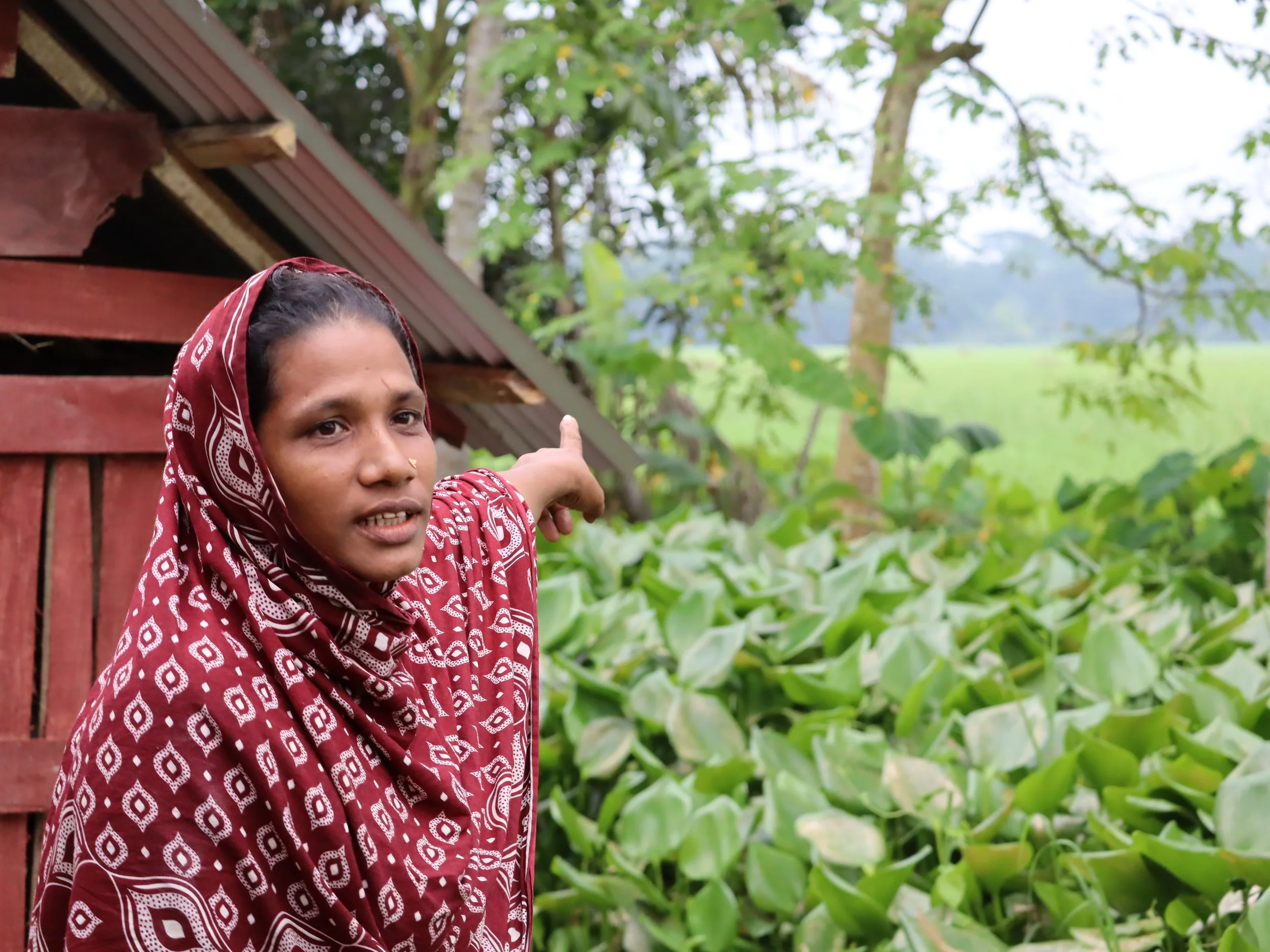When the waters rise, so do we: Local responders lead recovery after Cyclone Remal and floods in Bangladesh
By Falastin Omar, Change Fund Manager at NEAR
When Cyclone Remal struck Bangladesh’s southwest coast in May 2024, winds and storm surges tore through 20 districts, damaging homes, embankments, and schools, and displacing millions. Weeks later, floods inundated Noakhali, Feni, and Cumilla, compounding losses for communities still recovering.
The NEAR Change Fund responded to both crises, activating two locally led consortia that together reached more than 43,000 people across the country’s most climate-vulnerable districts.
Locally led from start to finish
For the Cyclone Remal response, Dwip Unnayan Songstha (DUS) led a consortium: Dhaka Ahsania Mission (DAM), Rupantar, Jago Nari, SANGRAM, and Society Development Agency (SDA). Together, they reached some of the hardest-hit coastal and riverine communities across Bhola, Patuakhali, Barguna, Khulna, Bagerhat, and Satkhira, providing clean water, shelter repair, food, cash, and protection services.
In parallel, DUS led a second consortium with Young Power in Social Action (YPSA) and Aid Cumilla to restore livelihoods and rebuild infrastructure in the flood-affected districts of Noakhali, Feni, and Cumilla.
Within weeks of the crisis declaration, teams were on the ground repairing tube wells, building latrines, restoring access roads, and distributing hygiene materials. The combined interventions provided clean water, cash transfers, and emergency shelter to households that had lost everything.
Sumera Javeed, Oversight Body Member of the Change Fund, observed during the recent learning visit, “what stood out most was the depth of community involvement and the sense of ownership cultivated by local partners implementing the Change Fund projects.”
The project also integrated climate adaptation elements, planting trees, promoting home gardening, and strengthening links between humanitarian, development, and peacebuilding actors. Each partner leveraged local vendors and volunteers, minimizing costs and ensuring resources stayed within the community.
A re-excavated community pond provides safe water for families recovering from Cyclone impact.
Flexibility in the face of adversity
Extreme weather, political unrest, and banking disruptions could have halted progress. Instead, the consortia demonstrated the flexibility that defines the Change Fund. When rising salinity made tube wells unusable in coastal areas, partners installed community water tanks and when cash-flow shortages delayed vendor payments, they turned to trusted local suppliers.
This adaptability was possible because partners were empowered to make decisions in real time. The Change Fund’s flexible structure allowed them to modify activities, reallocate budgets, and adjust procurement methods as the situation evolved. Even amid political instability and transport strikes, local teams found ways to keep implementation moving by sourcing materials locally and mobilising community volunteers.
Digital cash transfers through NAGAD and bKash allowed families to purchase materials and food quickly, while Cash-for-Work programmes supported the repair of damaged roads and community spaces. Each decision reflected a grounded understanding of context and the agility of local actors to adapt in real time.
As reflected on by Md. Rafiqul Alam, Executive Director, DUS & Chairperson, NAHAB, “These initiatives stand as a strong example of network members’ collaboration, localized decision-making, and flexible funding mechanisms that make a real difference in humanitarian response and recovery efforts.”
Sustainability and learning through local leadership
Almost a year after Cyclone Remal and the devastating floods, the impact of these locally led responses continues to be visible across the affected districts. Because the response was driven by organisations rooted in their own communities, the outcomes have proven durable not just immediate relief.
Livelihoods restored through home gardening and fisheries have continued to sustain families long after the projects closed. Water points and sanitation facilities remain functional under the care of local maintenance groups established during implementation. District-level collaboration between partners, local government, and community leaders has also deepened, leading to joint planning for future disaster preparedness and climate resilience.
A farmer displays vegetables grown from seeds distributed through the Change Fund's cyclone Remal response. Agricultural inputs supported families replant their home gardens, restore nutrition, and strengthen resilience.
In Barguna District, a community member stands beside her restored home garden. Through the NEAR Change Fund's Cyclone Remal response, she received seeds and support to replant and rebuild her livelihood after the floods.
Community members, who were central to decision-making and monitoring, now serve as stewards of these interventions. Their involvement has ensured that lessons from the crisis, on preparedness, accountability, and collective action are retained within the community itself.
In Barguna Sadar, a community member uses installed hand-pump part of NEAR Change Fund’s post-flood recovery support restoring access to clean water and sanitation after the 2024 eastern flood.
This enduring impact demonstrates that when local responders lead the response, recovery becomes not just faster, but more sustainable. The Change Fund’s approach has shown that locally anchored leadership transforms humanitarian action into long-term resilience.
Transforming how aid works
The Bangladesh response epitomises what the Change Fund was built for: swift, flexible, locally led action in the world’s most climate-vulnerable settings.
Sumera reflected on the broader significance that “their approaches are deeply grounded in listening, respect, and inclusivity. Instead of imposing external models, these organisations co-design interventions with communities, ensuring that every action resonates with local needs, values, and capacities.”
Listening and learning — Shahida Arif, Asia-Pacific Regional Representative (left in white) ,and Sumera Javeed, Member of the Change Fund Oversight Body (right in pink), meet with flood-affected communities in Noakhali to hear firsthand how Change Fund support has helped families rebuild their lives.
Through the Change Fund, NEAR continues to strengthen the capacity of national organisations like DUS, DAM, Rupantar, Jago Nari, SANGRAM, SDA, YPSA, and Aid Cumilla, ensuring that resources reach those most affected, not months later but when they are needed most.
—————
For more on these projects, please see the video: https://www.youtube.com/watch?v=77wbQJI6T3Q







